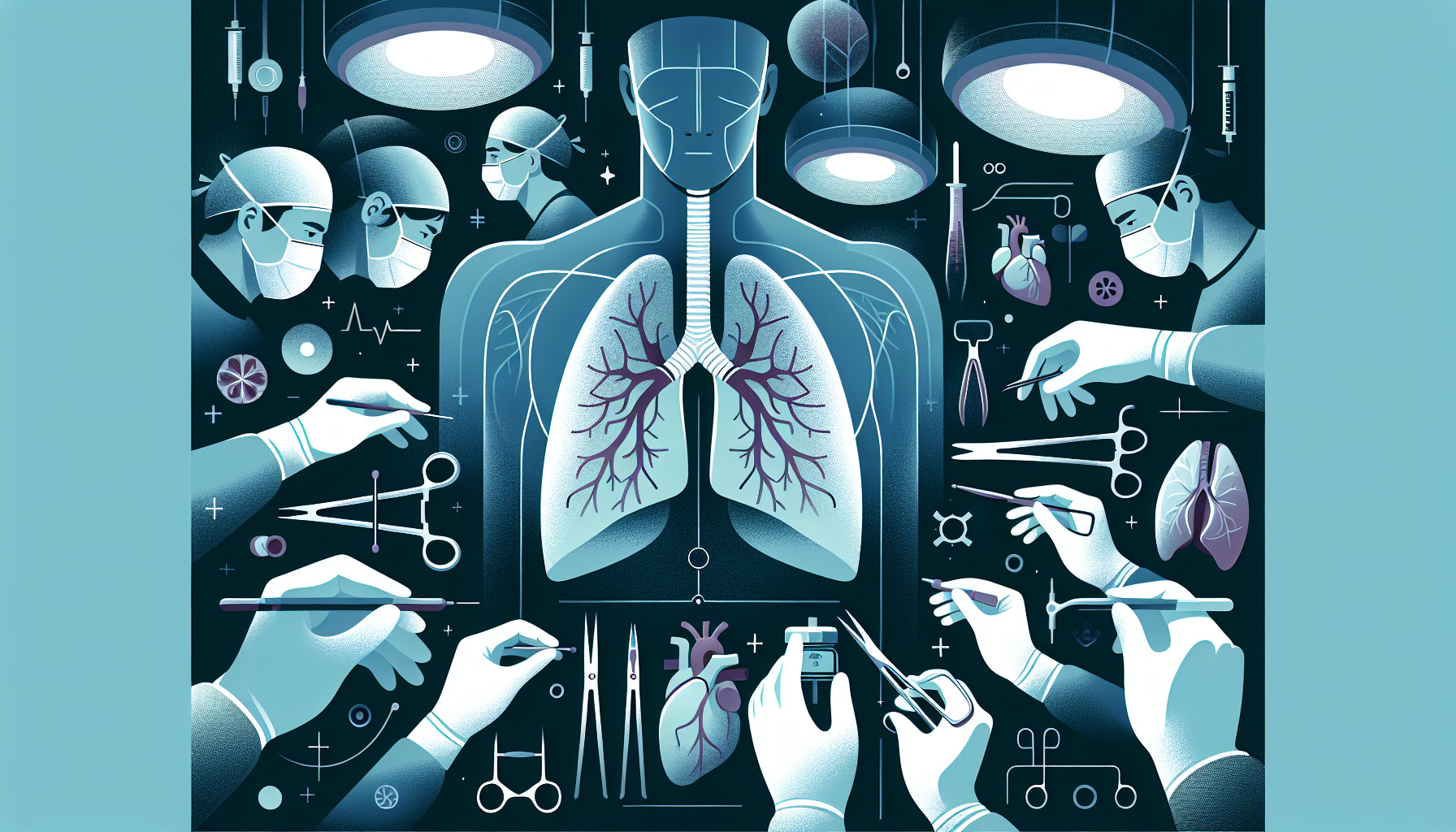Our Summary
This study examines the health and longevity of people who have had lung transplants. The researchers found that out of 128 patients who had undergone a lung transplant, 21 (or approximately 16%) lived for over 20 years after their operation. The average age of those being transplanted was around 32 years old.
Most of these patients (over 90%) developed a lung disease called bronchiolitis obliterans syndrome (BOS) within 20 years of the transplant, with the median time for BOS to occur being 9.7 years. BOS is a form of chronic rejection that affects the airways of the lungs.
Also, around 38% of the patients needed kidney replacement, with about 19% of them receiving successful kidney transplants and another 19% needing hemodialysis, a treatment for kidney failure.
Almost all patients (90%) were treated for high blood pressure and about a quarter of them developed diabetes, particularly those who had cystic fibrosis.
The researchers concluded that, although lung transplant recipients often develop BOS and other health issues due to the immunosuppression necessary to prevent organ rejection, these conditions can be managed to allow for long-term survival.
FAQs
- What percentage of lung transplant patients lived for over 20 years after their operation according to the study?
- What is Bronchiolitis Obliterans Syndrome (BOS) and how common is it among lung transplant patients?
- What percentage of lung transplant patients required kidney replacement and how were these cases managed?
Doctor’s Tip
One important tip a doctor might give to a patient who has had a lung transplant is to closely follow their medication regimen, including immunosuppressants, to prevent rejection of the new lung. It is also crucial for the patient to attend all follow-up appointments and communicate any changes in symptoms or health concerns to their healthcare team. Additionally, maintaining a healthy lifestyle with regular exercise, a balanced diet, and avoidance of smoking and exposure to pollutants can help improve long-term outcomes after a lung transplant.
Suitable For
Patients who are typically recommended for lung transplant are those with end-stage lung disease, such as cystic fibrosis, chronic obstructive pulmonary disease (COPD), idiopathic pulmonary fibrosis, pulmonary hypertension, and other severe lung conditions that cannot be effectively treated with other medical therapies. These patients typically have a poor prognosis and significantly impaired quality of life, and a lung transplant may be their only option for survival.
It is important for patients to undergo a thorough evaluation process to determine their eligibility for a lung transplant, including assessing their overall health, lung function, and ability to tolerate the surgery and post-transplant medications. Patients also need to be compliant with medical treatment and capable of adhering to the strict post-transplant care regimen to ensure the success of the transplant.
Ultimately, the decision to recommend a lung transplant is based on the patient’s individual medical history, prognosis, and quality of life, and is made by a multidisciplinary team of healthcare providers, including pulmonologists, transplant surgeons, social workers, and psychologists.
Timeline
Before lung transplant:
- Patient is diagnosed with a severe lung disease, such as cystic fibrosis, pulmonary fibrosis, or chronic obstructive pulmonary disease (COPD)
- Patient undergoes extensive evaluations and testing to determine if they are a suitable candidate for a lung transplant
- Patient is placed on a waiting list for a donor organ
- Patient may experience deterioration in lung function, difficulty breathing, and decreased quality of life while waiting for a transplant
After lung transplant:
- Patient undergoes surgery to receive a new lung or lungs
- Patient is closely monitored in the hospital for complications and to ensure the new organ is functioning properly
- Patient is prescribed immunosuppressant medications to prevent organ rejection
- Patient undergoes regular follow-up appointments and testing to monitor lung function and overall health
- Patient may experience side effects from immunosuppressant medications, such as increased risk of infections, diabetes, high blood pressure, and kidney problems
- Patient may develop complications such as bronchiolitis obliterans syndrome (BOS), a form of chronic rejection that affects the airways of the lungs
- Patient may require additional treatments, such as kidney replacement or management of other health issues that arise post-transplant
- Despite potential challenges, many patients can experience improved lung function, quality of life, and long-term survival after a lung transplant
What to Ask Your Doctor
Some questions a patient should ask their doctor about lung transplant include:
What are the potential risks and complications associated with a lung transplant?
How long can I expect the transplanted lung to function effectively?
What medications will I need to take post-transplant and what are the potential side effects?
How often will I need to follow up with my healthcare team after the transplant?
What lifestyle changes will I need to make after the transplant to ensure the best possible outcome?
How will the transplant affect my overall quality of life?
What is the likelihood of developing complications such as bronchiolitis obliterans syndrome (BOS) or other health issues post-transplant?
What support services are available to me and my family throughout the transplant process and recovery?
How will the transplant affect my ability to work, travel, and engage in physical activity?
What are the long-term implications of having a lung transplant, including the potential need for additional organ transplants or treatments for related health conditions?
Reference
Authors: Sithamparanathan S, Thirugnanasothy L, Clark S, Dark JH, Fisher AJ, Gould KF, Hasan A, Lordan JL, Meachery G, Parry G, Corris PA. Journal: Respir Med. 2016 Aug;117:103-8. doi: 10.1016/j.rmed.2016.06.008. Epub 2016 Jun 7. PMID: 27492519
